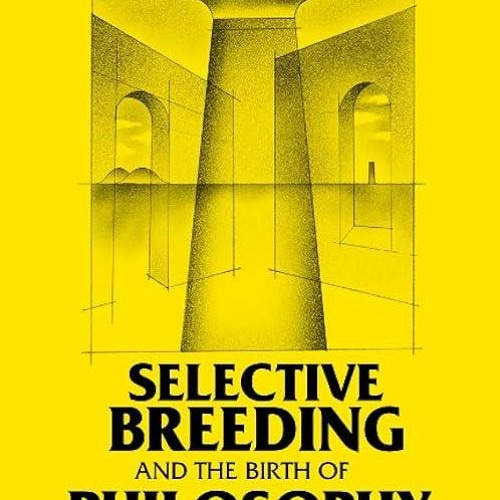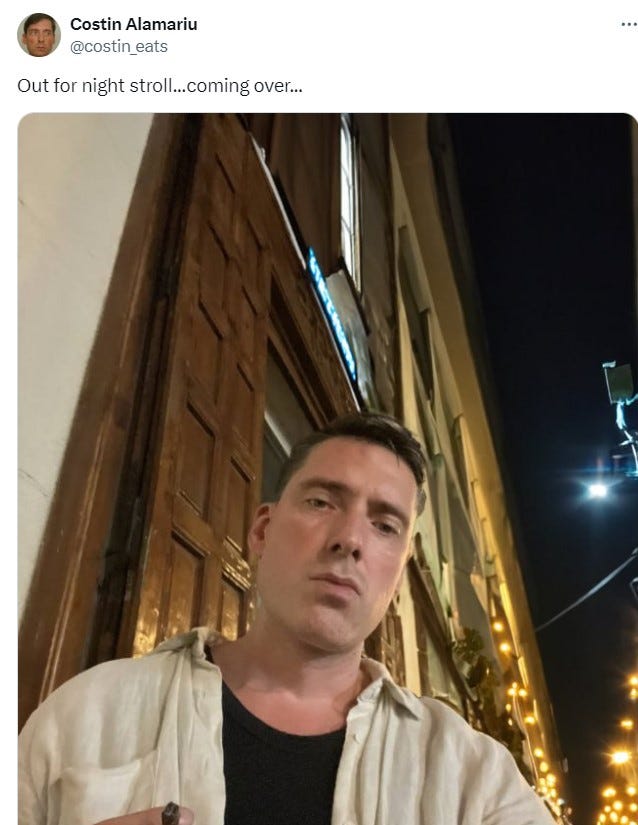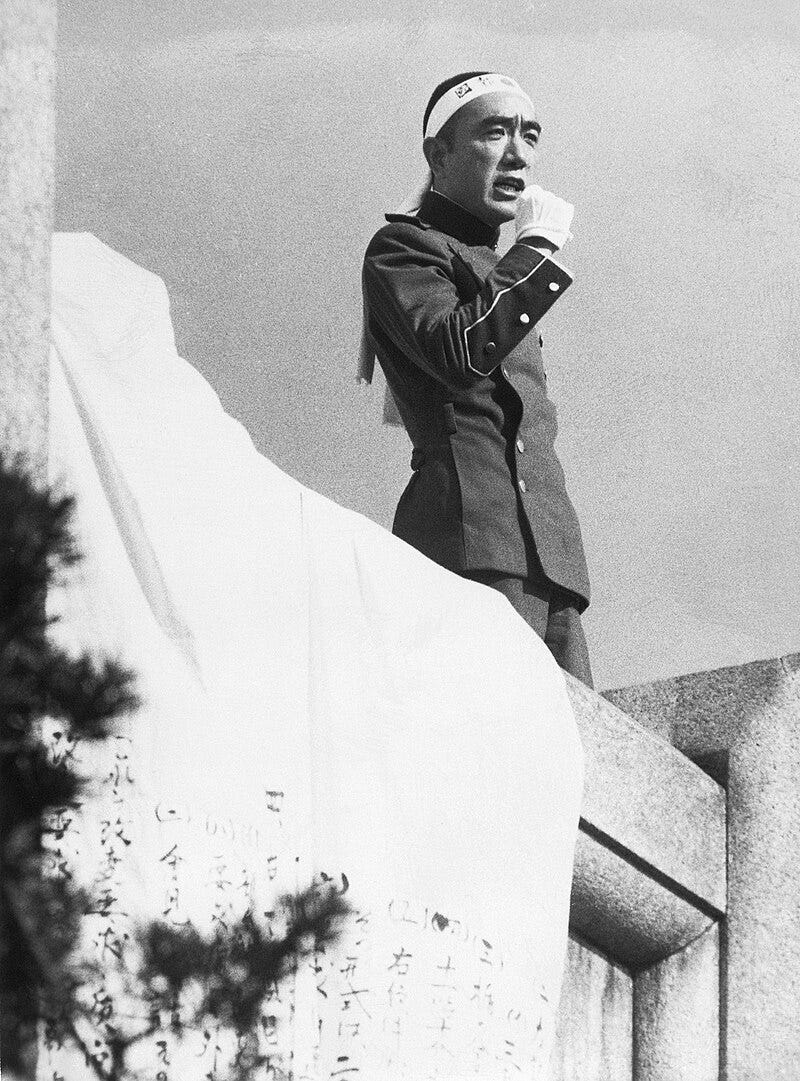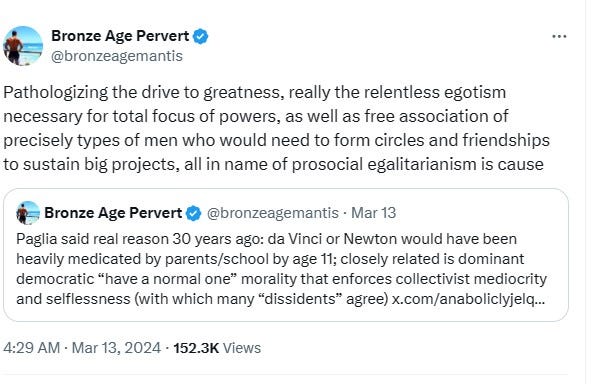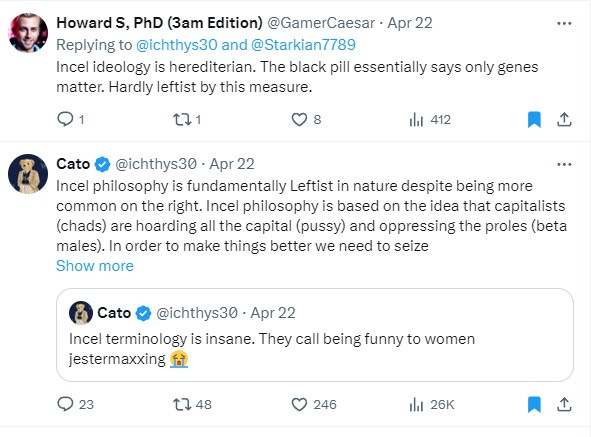Review of Costin Alamariu’s Selective Breeding and the Birth of Philosophy, by Robert Stark
Selective Breeding And The Birth of Philosophy by Costin Vlad Alamariu, was published last fall and briefly cracked Amazon’s top 25 sellers. Selective Breeding is a publishing of Costin’s dissertation (originally published in 2015), which has been available online for free for years, but with a new preface, and an explanatory introduction that adds upon the case presented in his original thesis. Selective Breeding is much more academic than anything Costin has written as Bronze Age Pervert. While Costin Alamariu and BAP are separate authorial entities, it is obvious that they are one and the same. Costin was doxed by the media a while back but sort of self-doxes himself with clues and similar themes. A lot of people were harmed by doxing but he successfully got the best of his adversaries.
Source: @costin_eats on X
Selective Breeding enforces the philosophical backdrop to BAP’s book, Bronze Age Mindset, which BAP has insisted is not philosophical but an exhortation. Reading BAM will help you understand Selective Breeding and vice versa. BAM is an anti-liberal/democratic proclamation, declaring itself the enemy of the entirety of the Western status quo/establishment. The new introduction in Selective Breeding ties in many classic dissident right talking points, like the “Sexual Marketplace,” as presented by F. Roger Devlin, genetic differences between different groups, and the relevance of the rise of the Alt-Right to the thesis.
Selective Breeding is filled with arguments, fixations, and turns of phrase that one can recognize from BAP’s online presence, from Bronze Age Mindset, and his podcast, Caribbean Rhythms. For instance, the idea that modern marriage is a raw deal for men, the idea that the Left is not relativistic but feverishly ideological, the failure of Marxists to have an answer to inborn and sexual hierarchies and inequalities, the notion of owned space, the idea of “mere life” as having no intrinsic value, THE LONGHOUSE, and his theory that Tibetan Buddhist monasteries were modeled after Steppe war-bands. In a paragraph from Nietzsche’s Beyond Good and Evil, Costin writes, “At this turning-point of history there manifest themselves, side by side, and often mixed and entangled together, a magnificent, manifold, virgin-forest-like up-growth and up-striving, a kind of TROPICAL TEMPO in the rivalry of growth, and an extraordinary decay and self-destruction….” This is obviously a veiled reference to BAP’s, Caribbean Rhythms.
Selective Breeding’s thesis deals with the foundations of peoples and civilizations, of aristocratic decline, tyranny, the invention of systems of morality, and the birth of philosophy. Costin, like Nietzsche, puts forth an anecdote to Christianity, seeking to take philosophy back to the understanding of nature held by the Greek aristocracy. The thesis is an attempt to prove that the true aristocratic regime and aristocratic morality, are fundamentally linked to nature.
Nature is hierarchical and can be tyrannical, yet it contains the ethereal essence that inspires man to transcend. Costin points to the figure of Chiron, the Centaur and teacher of youth in the forest. This archetype transmits the Greek notion that one must escape the city limits, and the merely human to properly learn and evolve. Costin also argues that the Greek poet, Pindar, abstracted or distilled the concept of nature in his poetry from the fundamental political principle of Greek aristocratic life. The wandering pastoral types glimpsed nature when they were able to break away from the life of custom alone. I am interested in the idea of recreating the conditions of freedom and understanding nature that birthed philosophy and tyranny within the world as it is, within space that is “fully” controlled,” in BAP’s parsing. Since all space is now controlled, Costin points to Tibetan Buddhism and even Gnosticism as wanderings by other means.
When an aristocracy or civilization loses that natural essence, it starts to decline. The purpose of philosophy can be both to fulfill biological imperatives and to legitimize convention. Today we see the aristocracy totally replaced by a soulless and utilitarian managerial elite class. Costin also makes comparisons to today with pre-Aristocratic/pre-Indo Aryan Longhouse societies, which still ostensibly had hierarchies. However, the chieftains in these situations were just representatives of the will of the people, slaves to the collective whims of the many, the hive/yeast life rules, marked by the domination of women and elders. Costin believes that modern Democracy (not to mention the Communist ideal) drags society back toward this historical norm.
Costin believes that this teaching of nature is politically explosive and corrosive towards all conventions, myths, and pieties of the regime. Costin believes that liberal Democratic ideas are doomed to fail since they cannot generate the same kind of will-to-power as say Communism or Fascism. They lack what Heraclitus described as fire, and what Nietzsche presented to the World anew as “the will to power.” The Aristocratic regime finds itself giving way to the mediocrity of the masses. After the old aristocracy is dead, philosophy, as well as art, can serve to preserve the aristocratic spirit. You recreate that via the life of the mind, that is the birth of philosophy.
How do the aristocratic principles of good breeding and the study of nature become philosophy? Costin’s thesis is as concerned with the problem of tyranny as breeding and makes the connection that both breeding and philosophy are founded upon some initial glimpse at nature. Costin believes that Christianity ended up mis-breeding man, breeding the wrong type of man, the last man. Nietzsche considered Christianity to be a slave morality (eg. love of weakness), fully reversing the selective breeding ethics of the Greeks. However, Costin, like Nietzsche, contends that the Platonic project was, in essence, so successful that when philosophers became priests and moralizers, they lost sight of nature. Thus philosophy must be the radicalization of the principle of nature and breeding.
The image of sperm racing each other, however silly, might be useful here since the early Greek appraisal of nature often manifested as odes to athletic prowess. Stern discipline makes the cessation of discipline that much greater. If one affirms the competitive and inherent inequality of breeding, then you have the birth of philosophy. Philosophy, like breeding, must not lose touch with the idea of nature. Nature was defined first in opposition to nomos or convention: the life of the Longhouse .
The Greek aristocracy, including Greek philosophers, were obsessed with breeding and skeptical of Democracy, which has been de-emphasized to legitimize Liberalism. Costin uses Plato’s, the Gorgias, to back up his anti-democratic thesis. Costin believes that Plato and Nietzsche had the same understanding of reality and belief that philosophy must preserve aristocratic values. Another reason there are misconceptions about the essence of Plato was because Plato considered philosophy to be in danger from accusations of tyranny, and thus was engaged in a process of associating it with justice and other virtues.
Costin believes that aristocracies can never emerge organically from groups of people ruled by convention, but must emerge when one people conquers another. While the conquering and conquered groups might intermix to form an ethnogenesis (eg. Dorian and non-Dorian Greeks and Norman and non-Norman English), the structure marked by the original conquest is still there. An aristocracy descended from a conquering people will naturally take breeding seriously, to preserve their aristocracy. Costin also talks about the Hutu and Tutsis in Rwanda, how one group lived in conspicuous luxury while the other was seen as irascible and not-too-bright but hard-working. This structure repeats itself everywhere, even among Black Africans.
Costin has a strong interest in how pastoral peoples turned into conquering war-band-type people. Much like various rightwing health nuts, like Stone Age Herbalist and Raw Egg Nationalist, Costin believes that the pastoral diet of meat and cheese versus cultivated grains strengthens the body and mind and enables tribes to conquer weaker tribes. This combined with animal husbandry, and the discovery of heredity, gave them a proto-scientific and proto-philosophic understanding of nature, as opposed to the understanding of things based on convention, myth, and fear.
There is something inherently antinomian, or beyond good and evil, about philosophy, just as there is something beyond good and evil about breeding. However, when applied to politics there is potential for tyranny. In the Gorgias, Socrates is pitted in conversation with Callicles who argues for a “might makes right” antinomianism in both life and politics. Socrates expresses concern about antinomianism falling into the wrong hands and becoming used to promote degeneracy.
Especially now, since the man of today is not well-bred , philosophy, politics, and antinomianism should be the province of the few. Even Nietzsche never said master morality was for everyone and seemed resigned to the fact that the herd will always be led by slave morality. The risk of the pursuit of pleasure being proselytized as the greatest good is that those without well-ordered souls will pursue it destructively. The life in which the pursuit of pleasure is defined as the greatest good may be an inevitable extension of antinomianism. While everything comes from the erotic spark , in our time especially, hedonism is deeply disordered, and a fire that can get out of control in the wrong hands.
Costin quotes Nietzsche in that the flourishing of culture, the birth of philosophy, and tyranny are the result of a burst of antinomian creativity that an aristocracy executes at the moment it senses its demise. The key image is that of a flower finally blooming from a stem hardened by years of applying the potential flower energy back into itself. This can manifest itself as tyranny, but also as aesthetic splendor in the arts. This explains why our declining civilization is seeing these bursts of sexual degeneracy, but also creativity and political radicalism.
There are cases where one might have a disordered spirit, but still ultimately become a positive creative force, and the disorder can be rooted back to order. I think this is what BAP means when he talks about descending into the filth of things, in order to ascend. BAP has even joked about starting his own pornography production company. He also considers the criminal outsider to be more philosophically attuned to nature outside the city or the Longhouse, as they seek out a feral regime that rules outside and above all laws and conventions.
BAP is more tolerant of “degeneracy” and is not a prude like much of the Trad right, yet is still fundamentally rightwing. Costin/BAP has given the example of Yukio Mishima, as an aspirational right-wing figure and sensitive type, who internalized the ownership of space and fetishized his attraction to masculine vitality. Mishima’s fetishes had a more deeply, positive meaning… so we can’t even dismiss people simply for being perverted. The affirmative path is still possible. Costin also says this about French author, Andre Gide, who was a Communist and notorious self-professed pederast. The same could be said for Oscar Wilde, Aleister Crowley, and William S. Burroughs, all of whom experienced something of what BAP would call a disordered desire.
Costin says something to the effect of: “All breeding culture that is not grounded in eugenic aims will eventually become dysgenic. Eugenics are generally frowned upon, not just from leftist perspectives, but also religious ones, including many right-wing Christians. However, eugenics still lives on, it just goes by other names like “family planning,” and new technologies that detect Down Syndrome. Everything pertaining to abortion and birth control has direct effects, some of them by design (e.g. Planned Parenthood founder Margaret Sanger’s eugenic intentions). There are some protests against these and other genetic-selection initiatives but some versions of them will likely remain legal in the West, while technologies like gene-editing will advance in the future. Modern Western eugenics puts eugenic choices in the hands of the mother, and perhaps to a lesser extent, the male via sexual selection.
Breeding and competition for sex and breeding are inherently and brutally inegalitarian, and what we call eugenics with alarm is going to happen one way or the other. Breeding choice, the question of who gets to breed and with whom does not happen in a vacuum. Breeding is heavily impacted by just about every societal factor, from explicit political legislation to cultural trends to technology. Dating apps have one effect on breeding, and the student debt crisis another (clearly negative, given that it essentially disincentivizes more educated people from breeding). Institutions, such as universities and careers assist assortive mating, so rather than the liberal ideal of a blended humanity, we will end up with a more genetically stratified, caste society. In The War On Normal People, Andrew Yang observes that back in the 80s, good-looking and athletic young people were ditzy while smart people were nerds, but today’s rich kids at elite universities are intelligent but also attractive, physically fit, and charismatic.
Sex and sexual selection are a brutal process that scars almost everyone involved, producing a small group of winners and a large group of losers. BAP cites the pain of the incel, as captured in the work of Michel Houellebecq, as a horrible reminder of the dark realities of nature that our so-civilized discourse on the topic often eschews. Nature allowed this to happen since it is viciously amoral. Costin highlights the way that even the most extreme egalitarianist Marxists have never come up with a satisfying proposal for how the issue of sexual competition, as well as the interpersonal and inter-group strife that inevitably results from sexual competition, would be resolved in a Marxist state.
Costin channels F. Roger Devlin in how bad the sexual marketplace currently is, how the decline of moral codes like the enforced monogyny of Christianity, or the rigorous guidelines for breeding laid out in the ancient Vedic, Law Of Manu, have not led to a sexual utopia, but to the brutality of nature unveiled. All breeding choices have effects that can generally either be categorized as eugenic or dysgenic. Costin’s modest proposal is that if the process of mate selection is going to be brutal and inegalitarian anyway, why not promote the version of that dark brutality that bears good results and is beneficial to human excellence? There is an attempt to bring us all back toward a gelatinous goo of goon-caves, and maybe a future of mandated in-vitro-fertilization, but somehow nature will find a way; through selective horniness.
The Greeks had an implicit understanding of the profound realities of heredity and breeding; they knew intuitively what science has only recently shown definitively about heredity and what is inherited by children from their parents. Good breeding also corresponds to education and rearing (a way in which we still sometimes hear it used, albeit archaic). Is this the secret behind the autistic British obsession with things like dog shows? The way dogs are tested on looks and behavior, and the similarities between this way of dealing with dogs, and the stereotypical British/ upper-crusty notion of child-rearing, good behavior, and good form. These things strike us as aristocratic to their very core, even as we chuckle at their supposed stuffiness.
What Costin’s book is not is a scientific defense of HBD or a scientific attack on blank-slatism, nor any kind of practical guide or prescriptions for eugenics. However, there are a few HBD studies of DNA in the later-written introduction, which are identified as a ground-breaking paradigm shift that the academic mainstream has attempted to ignore. Costin gets a bit into what selective breeding might look like in the introduction, but for the most part, there are no logistics, such as specific breeding incentives, nor is anything like sterilization or gene editing advocated. In fact, BAP has dismissed HBD bloggers as “bean counters” and nerds who lack vitality.
Source: @bronzeagemantis on X
Selective Breeding is, first and foremost, a philosophical defense of selective breeding as an ideal, and by extension the ruthless pursuit of human excellence. For Costin, just like the Greek aristocracy, good breeding is about promoting human excellence, aesthetic, athletic, intellectual, and spiritual. This is obviously where BAP’s crypto homoerotic, Handsome Thursday, stuff comes in. Costin’s defense of the Alt-Right is as a “youth movement,” the reaction of young males against the liberal-blank-slatism and bourgeois morality that dominates institutions. These young men are who has the energy and vitality in a Nietzschean sense.
Costin is critical of the rebranding of old-school racism/racial nationalism which he dismisses (at least for its piss-poor PR). Costin is half-Jewish, so I doubt he is an admirer of the Third Reich. The Nazis diverged from Nietzsche through their commitment to blood and soil (a type of notion arguably deeply at odds with Nietzsche’s commitment to the free spirit). Nietzsche addressed his work, not to any particular ethno-national group, but to the man of the future. Costin/BAP is deeply concerned about the drift away from Truth, excellence, and the transcendent.
Both liberal and Christian morality can function as ways to mask inherent inequalities in nature rather than eliminating inequality, which explains why oligarchs back liberal and woke causes. Contemporary American society combines the worst attributes of liberal egalitarianism and slave morality with Social Darwinism. However, even if egalitarianism is a lie, people co-corporate and set aside the cutthroat competition and power struggles for peace and stability. Attempts at quasi-egalitarian societies can work where people are genetically similar, form an arrangement based upon reciprocity, or benevolent elites show noblesse oblige towards their subjects. Not to mention that Christianity has had some successes in stifling the worst of human nature. However, that inherent inborn inequality is always there under the surface. Honesty about human nature is a better way to deal with inequality than lying to people that we are all born equal.
BAP’s philosophy could hypothetically be used by tyrants, or used to justify tyranny, though I suppose the same could be said of many of my views. Another criticism of BAP is that he is apologetic for capitalism and opposes the Right flirting with socialism, even though capitalism selects against aristocratic values and traits, and that corporate culture epitomizes the Longhouse. BAP is also critical of the kind of ethnopluralism or rightwing multiculturalism that I advocate for, on the grounds that it is spiritually leftist and accepting of a managed decline.
BAP’s view that any true meritocracy and eugenics should be based on martial traits has major potential downsides, just as the Longhouse or mercantile/managerial rule does. Even though military rulers often suppressed intellectuals and artists, Mussolini had the backing of the Italian Futurist Arts movement and Ezra Pound. who epitomized the starving artist archetype and believed that artists should form the natural aristocratic elite of society. I favor the proportional inequality that Plato advocated for or a Tripartite arrangement, where laborers, warriors, artists, spiritualists, and perhaps even merchants share power so that one archetype does not dominate a society spiritually, culturally, and politically.
The sensitive intellectual types who follow BAP might be better off under an Apollonian rather than Dionysian or Bronze Age order, and a lot of BAPists are likely nerds, LARPing as warriors. Even Nietzsche gets called hypocritical for being very physically weak, which is often the case for intellectuals, rather than the Aryan ideal of the warrior/philosopher, who is rich in both body and mind. I remember when Israel’s October 7th happened, and online trolls were giving BAP a hard time for denouncing the terror attack rather than embracing the “Bronze Age Mindset” of the Hamas raiders. Certainly, BAPists take for granted the comforts and security of Longhouse Civilization and lament the loss of rights that came from Classical Liberalism, such as free speech. While there are plenty of legitimate criticisms to be made of BAP/Costin, and he is certainly to the right of my views, he represents one of the better strains of the dissident right. His message is especially needed for a society that suppresses greatness, and especially the aspirations and potential of young men. Not to mention that BAP is very funny and entertaining.
Source: @bronzeagemantis on X

